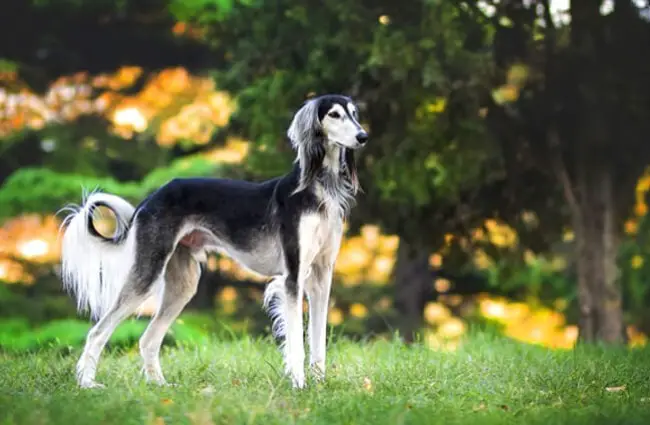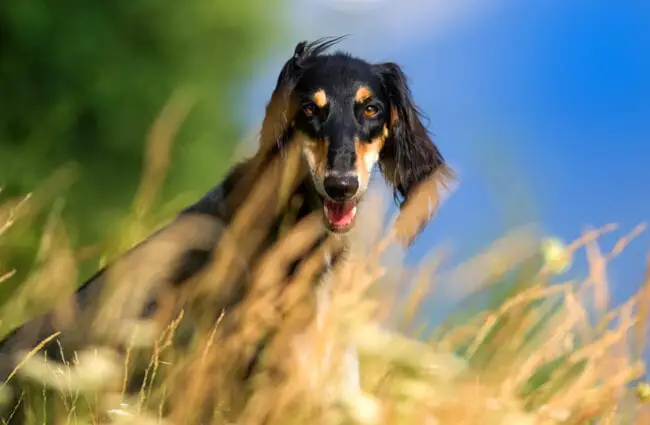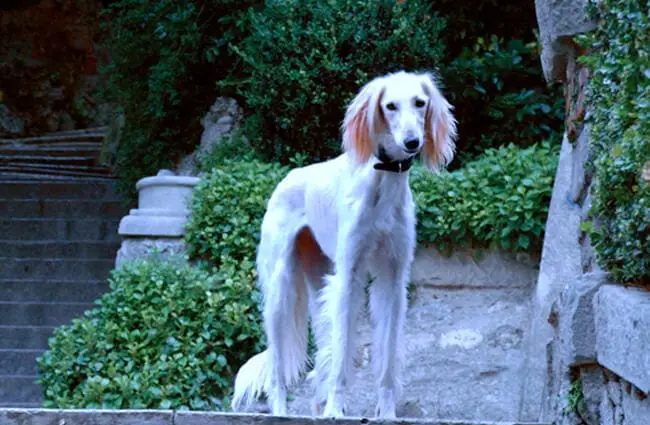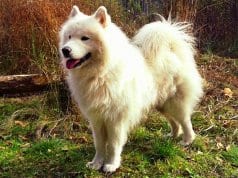The Saluki, often hailed as the “Royal Dog of Egypt” or the “Persian Greyhound,” is a creature of breathtaking elegance and ancient lineage. With a history stretching back millennia, this sighthound embodies grace, speed, and an enduring partnership with humanity. Far more than just a beautiful dog, the Saluki offers a fascinating window into canine evolution, adaptation, and the deep cultural bonds forged between species.
Unveiling the Saluki: An Overview
The Saluki is a medium to large sized dog, renowned for its slender, athletic build and aristocratic bearing. Its physical form is a testament to its purpose: a swift hunter designed for open plains and desert environments. These dogs typically stand between 23 and 28 inches at the shoulder and weigh anywhere from 35 to 65 pounds, with males generally larger than females. Their lifespan averages 12 to 14 years.
Two primary coat types exist: the feathered Saluki, featuring silky feathering on the ears, tail, and backs of the legs, and the smooth Saluki, which lacks this longer hair. Both types boast a short, soft body coat that comes in a vast array of colors and patterns, including white, cream, fawn, golden, red, grizzle and tan, tricolor, and black and tan. Their eyes are typically dark and intelligent, reflecting a keen awareness of their surroundings.
Temperamentally, Salukis are often described as reserved, independent, and gentle. They possess a quiet dignity and can be somewhat aloof with strangers, though they are deeply affectionate and loyal with their families. Their sighthound nature means they are highly driven by visual stimuli, possessing an innate desire to chase anything that moves quickly.

A Journey Through Time: Habitat and Evolution
The Desert’s Whisper: Natural Habitat
The Saluki’s origins are deeply rooted in the arid and semi-arid regions of the Middle East, particularly the Fertile Crescent, Egypt, and Persia. Their natural habitat encompasses vast stretches of desert, steppes, and rocky terrain. These environments demand speed, endurance, and keen eyesight to spot prey across expansive distances. The Saluki’s streamlined body, long legs, and deep chest are all adaptations perfectly suited for traversing such landscapes with remarkable agility and speed.
While Salukis are now found globally as cherished companions and show dogs, their ancestral home remains the desert. In these regions, they historically lived in close association with nomadic tribes, often sharing tents and being treated with immense respect, sometimes even reverence. This close bond allowed them to thrive in harsh conditions, benefiting from human protection and sustenance while providing invaluable hunting assistance.
An Ancient Lineage: Evolutionary History
The Saluki is considered one of the oldest dog breeds, with archaeological evidence suggesting its presence dating back over 7,000 years. Depictions of Saluki-like dogs appear on ancient Egyptian tombs, Mesopotamian artifacts, and Persian tapestries, underscoring their long and esteemed history. Genetic studies confirm their ancient lineage, placing them among the basal breeds, meaning they diverged very early from the ancestral wolf population, before most other modern dog breeds.
Their evolution is a testament to natural selection and selective breeding for specific hunting traits. Over millennia, their ancestors were refined for speed, stamina, and exceptional eyesight, crucial for hunting gazelles, hares, and other fast-moving desert game. This long history of co-evolution with humans in a specific ecological niche has shaped them into the unique canids they are today. Unlike many breeds developed for herding or guarding, the Saluki’s primary role was always that of a swift pursuit hunter, a living arrow launched across the sands.

Life in the Wild and Human Interaction
Finding a Saluki in the Wild: A Rare Encounter
For the animal lover hoping to find a Saluki in the wild, it is important to understand that truly wild Salukis, in the sense of an un-domesticated, self-sustaining population, are virtually non-existent today. The Saluki has been a domesticated companion for thousands of years. While some Salukis might be found in semi-feral states in their native regions, often associated with Bedouin tribes or living on the fringes of human settlements, these are not truly wild animals in the ecological sense. They are domestic dogs that have adapted to a more independent existence.
Therefore, encountering a “wild” Saluki is highly improbable. Any Saluki encountered in remote areas is far more likely to be a stray, a lost pet, or part of a working pack with a human owner. Their survival in harsh desert environments without human aid would be extremely challenging due to their reliance on human-provided food and shelter for millennia.
Encountering a Saluki: What to Do
Should a hiker or traveler encounter a Saluki in a remote or unfamiliar setting, the best course of action is to exercise caution and respect. Assume it is a domestic animal that may be lost, abandoned, or simply roaming. Here are some guidelines:
- Observe from a Distance: Do not approach immediately. Assess the dog’s demeanor. Is it fearful, aggressive, or curious?
- Avoid Direct Eye Contact: In many canine cultures, direct eye contact can be perceived as a challenge.
- Speak Calmly: Use a soft, reassuring voice if you need to speak.
- Do Not Run: Running can trigger a Saluki’s strong prey drive.
- Offer No Food: While well-intentioned, offering food can sometimes lead to possessiveness or encourage unwanted following.
- Check for Identification: If the dog appears friendly and approachable, look for a collar or tags.
- Contact Local Authorities: If the dog appears distressed, injured, or truly lost, contact local animal control or rescue organizations. In their native lands, local villagers or Bedouin tribes might be the best point of contact.
Diet and Hunting Strategies
In their historical role as hunting companions, Salukis were primarily carnivores, subsisting on the prey they helped their human partners catch. This included small to medium-sized game such as gazelles, hares, foxes, and even jackals. Their hunting strategy is classic sighthound: they spot prey from a distance, then pursue it at incredible speeds, often working in pairs or small packs to corner and bring down their quarry. Their speed and agility are paramount, allowing them to outmaneuver and outrun even the swiftest desert animals.
In a modern domestic setting, a Saluki’s diet should reflect its athletic build and high energy needs. High-quality commercial dog food, rich in protein and healthy fats, is generally recommended. Some owners opt for raw or home-cooked diets, carefully balanced with veterinary guidance. Due to their lean build, Salukis can be prone to sensitivity to certain ingredients, so a consistent, nutritious diet is crucial. Portion control is also important, as their deep chests can make bloat a concern, especially after vigorous exercise.

Reproduction, Ecosystem Role, and Cultural Significance
Mating and Reproduction
Salukis, like most domestic dogs, typically reach sexual maturity between 6 and 18 months of age. Females usually come into estrus, or “heat,” twice a year, though individual cycles can vary. The gestation period is approximately 63 days, resulting in litters that can range from 4 to 8 puppies, though smaller or larger litters are not uncommon. Saluki mothers are generally attentive and protective, nursing their pups for several weeks before they begin to wean onto solid food.
In historical or semi-feral contexts, mating would occur naturally, with dominant males often siring litters. The survival rate of puppies in harsh environments would be lower than in controlled domestic settings, with natural selection favoring the strongest and most adaptable. In modern breeding programs, careful selection of breeding pairs is undertaken to maintain breed standards, health, and temperament.
Contribution to Ecosystem and Interaction with Other Animals
In their historical role as apex predators alongside humans, Salukis played a part in the local ecosystem by helping to manage populations of their prey species. By hunting gazelles and other herbivores, they contributed to natural selection, ensuring that only the fittest prey animals survived to reproduce. This interaction, however, was always mediated by their human handlers, making their ecological impact distinct from that of truly wild predators.
Today, the Saluki’s direct contribution to natural ecosystems is minimal due to its fully domesticated status. In a domestic environment, their interactions with other animals are typically managed. They can coexist peacefully with other dogs, especially if socialized from a young age. However, their strong prey drive means that interactions with smaller pets, such as cats, rabbits, or birds, must be carefully supervised or avoided entirely, as their instinct to chase and capture can be overwhelming.
A Cultural Icon: Contribution to Human Culture
The Saluki’s contribution to human culture is profound and enduring. Revered by ancient Egyptians, depicted in their art and mummified alongside pharaohs, they were considered sacred animals, often referred to as “El Hor” or “The Noble One” by Bedouin tribes. They were never bought or sold but given as gifts of honor, a testament to their esteemed status.
- Art and Literature: Salukis feature prominently in ancient art, from tomb paintings to intricate tapestries and pottery. Their elegant form has inspired countless artists and poets throughout history.
- Hunting Companions: For millennia, they were indispensable partners in the hunt, providing sustenance and sport. Their speed and keen senses were vital for survival in harsh desert landscapes.
- Symbols of Status: Owning Salukis was a mark of wealth and prestige, particularly among royalty and nobility in the Middle East.
- Modern Companionship: Today, Salukis continue to enrich human lives as beloved family pets, show dogs, and participants in sighthound racing and lure coursing events, where their natural instincts for speed and chase can be safely channeled.

Caring for a Saluki: Insights for Zookeepers and Owners
Caring for a Saluki, whether in a private home or a zoological setting, requires an understanding of their unique physical and psychological needs. Their ancient heritage as a sighthound dictates much of their care.
Essential Tasks for Saluki Care
- Exercise is Paramount: Salukis require significant daily exercise. This is not merely a walk around the block. They need opportunities to run at full speed in a securely fenced area. Lure coursing or sighthound-specific parks are ideal. Without adequate exercise, they can become restless or destructive.
- Nutritional Needs: A high-quality diet formulated for active, large breeds is essential. Due to their lean build, they can be sensitive to poor-quality food. Monitor weight carefully, as they are naturally slender, but extreme thinness can indicate health issues.
- Mental Stimulation: While not typically a “working” breed in the traditional sense, Salukis benefit from mental engagement. Puzzle toys, scent work, and consistent, positive reinforcement training can keep their intelligent minds active.
- Socialization: Early and ongoing socialization is crucial to ensure they are well-adjusted. Expose puppies to various sights, sounds, people, and other calm animals.
- Grooming: Both feathered and smooth Salukis require regular grooming. Feathered varieties need more attention to prevent matting in their longer hair. Regular brushing helps maintain coat health and reduces shedding.
- Health Monitoring: Salukis are generally healthy but can be prone to certain conditions common in sighthounds, such as sensitivity to anesthesia, bloat (gastric torsion), and certain cardiac conditions. Regular veterinary check-ups are vital.
- Comfort and Security: Provide a soft, comfortable bed, as their lean bodies lack natural padding. They thrive in a calm, predictable environment and appreciate a secure, familiar space.
What to Avoid
- Lack of Exercise: This is perhaps the biggest mistake. A bored, under-exercised Saluki is an unhappy Saluki, potentially leading to behavioral problems.
- Off-Leash in Unfenced Areas: Their prey drive is incredibly strong. A Saluki will chase a squirrel, rabbit, or even a blowing leaf across a busy road without hesitation. Always keep them on a leash or in a securely fenced area.
- Harsh Training Methods: Salukis are sensitive and respond poorly to harsh corrections. Positive reinforcement, patience, and consistency are key.
- Isolation: While independent, Salukis are social creatures who bond deeply with their families. Prolonged isolation can lead to anxiety.
- Ignoring Their Sighthound Nature: Expecting a Saluki to be a reliable off-leash companion in an open park or to ignore small, fast-moving objects is unrealistic and potentially dangerous.

Fascinating Facts About the Saluki
The Saluki’s long history and unique characteristics have given rise to a wealth of intriguing facts:
- Ancient Royalty: They are often called the “Royal Dog of Egypt” and were revered by pharaohs, sometimes mummified alongside their owners.
- Speed Demons: Salukis are among the fastest dog breeds, capable of reaching speeds up to 40-45 miles per hour over short distances.
- “Feathered” and “Smooth” Varieties: The breed comes in two distinct coat types, both equally recognized.
- Never Bought, Only Gifted: Traditionally, Bedouin tribes considered Salukis too noble to be bought or sold. They were only given as tokens of honor.
- Exceptional Eyesight: Their keen vision is their primary hunting tool, allowing them to spot prey from great distances in open terrain.
- Deep Chest, Tucked Abdomen: This distinctive physique is an adaptation for speed and endurance, allowing for maximum lung capacity.
- Sensitive Souls: Despite their athletic prowess, Salukis are known for their gentle and sensitive nature, often described as “cat-like” in their independence and quiet demeanor.
- Long-Distance Runners: While incredibly fast, they also possess remarkable stamina, capable of maintaining high speeds over considerable distances.
- Diverse Color Palette: Salukis come in almost every imaginable dog color and pattern, adding to their visual appeal.
- A Global Presence: From ancient desert sands to modern homes, the Saluki has journeyed across continents, captivating hearts with its timeless elegance.
Conclusion
The Saluki stands as a living testament to the enduring bond between humans and canids, a bridge connecting the ancient world with the present. From the sun-drenched deserts where it first hunted alongside nomadic tribes to the comfortable homes where it now graces families with its quiet dignity, the Saluki remains a breed of unparalleled grace and history. Understanding this magnificent creature means appreciating its evolutionary journey, its unique physical and temperamental traits, and the profound cultural legacy it carries. For students, animal lovers, and aspiring zoologists alike, the Saluki offers a rich tapestry of knowledge, reminding us of the incredible diversity and adaptability within the canine world.






![Red Angus Closeup of a beautiful Red Angus cowPhoto by: U.S. Department of Agriculture [pubic domain]https://creativecommons.org/licenses/by/2.0/](https://animals.net/wp-content/uploads/2020/03/Red-Angus-4-100x75.jpg)

